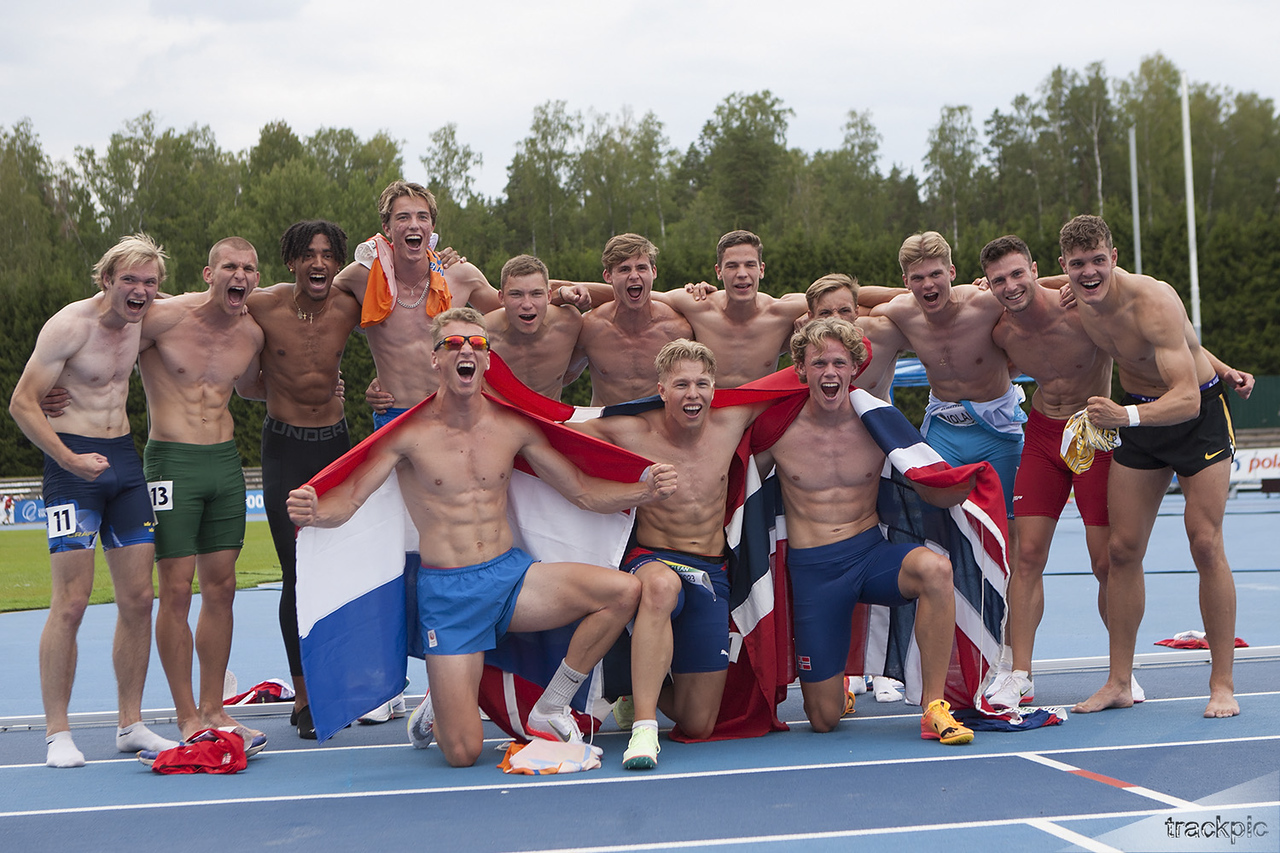Spare a thought for the poor Norwegian decathlon record.
Since 2018, the record had been minding its own business, under the responsible stewardship of Martin Roe.
It hadn’t been disturbed for almost 20 years before that. But those tranquil days are long gone for those 8228 points. Since April 2022 the record has been pummelled, battered and bruised. No minor tweaking, no gentle stretching. Rather, it has been attacked, repeatedly by two 21-year-olds. To 8307 by Markus Rooth in April 2022 in Grosseto, onto 8590 by Sander Skotheim in May this year in Götzis, and then again to 8608 this month by Rooth in Espoo, at the European U23 championships.
Norwegian decathlon has entered the age of “Rootheim”: Rooth and Skotheim.
The pendulum swing of the record over the last 15 months was mirrored in the oscillation of the standings over two days of sunshine, torrential rain, wind and thunder in the south of Finland.
Skotheim entered the competition as clear favourite, his 8590 from a few weeks previously in Götzis head and shoulders above what anyone else had achieved this season. Should Skotheim be a little short of those scores, perhaps only in shape to score 8200 or 8300, then the competition would be on.
Skotheim was in 8500+ shape, and his marks throughout the two days tracked his Götzis score closely. But the dynamic could not have been more different. In Austria, Skotheim performed way above expectations, and phenomenally well, to place third behind the global talents of Pierce LePage and Damian Warner.
However, in Espoo, Skotheim’s numbers might have been the same, his talent the same, and his execution the same. But from the very first event, Rooth was everywhere. Where we would expect him to be – in the shot, in the discus, in the javelin. But Rooth was also where we did not expect him to be – in the sprints, in the vertical jumps, in the 1500m. And most significantly, breathing down Skotheim’s neck at the end of Day 1.
DAY 1
The 100m was largely blessed with favourable winds and fast times, with almost half the field running lifetime bests. Among them was Rooth, 10.81s to Skotheim’s easy 10.86s, 903 points to 892. Those 11 points, those tiny, unexpected gains would accumulate in value if Rooth found himself in range of Skotheim as the ten events went on.
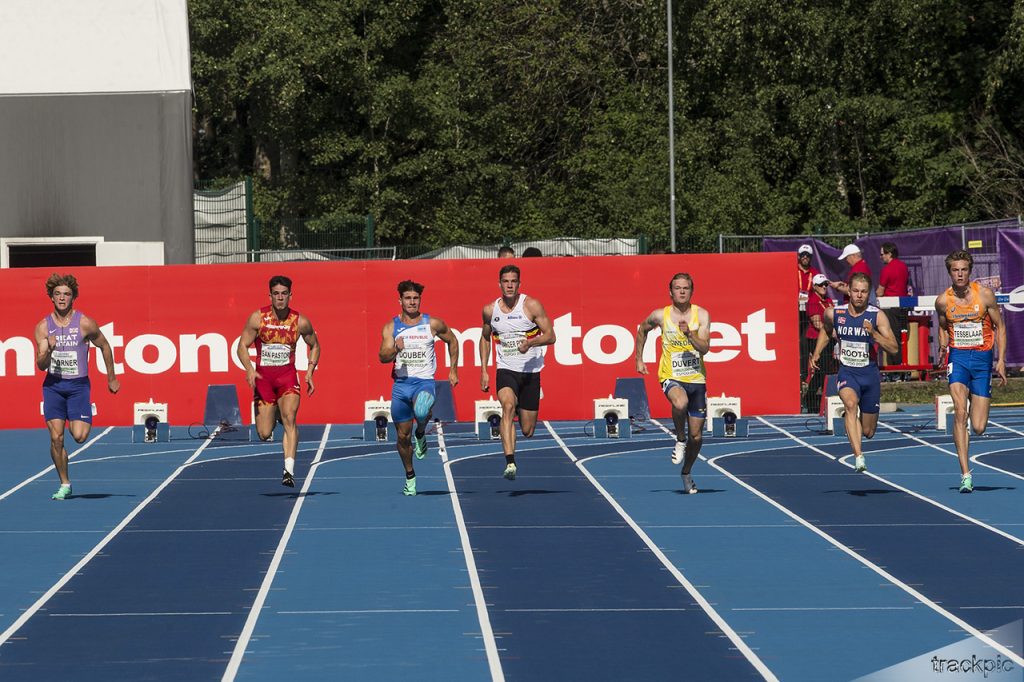
Fortune favoured the Norwegians in the long jump, both benefitting from generous tail winds. Skotheim enjoyed a +3m gust to take him into his 7.70m range, and Rooth +3.6m to take him to 7.61m, 8cm beyond his PB. Another little gain for Rooth, remaining within 12 points of Skotheim as the latter took the lead with 1877.
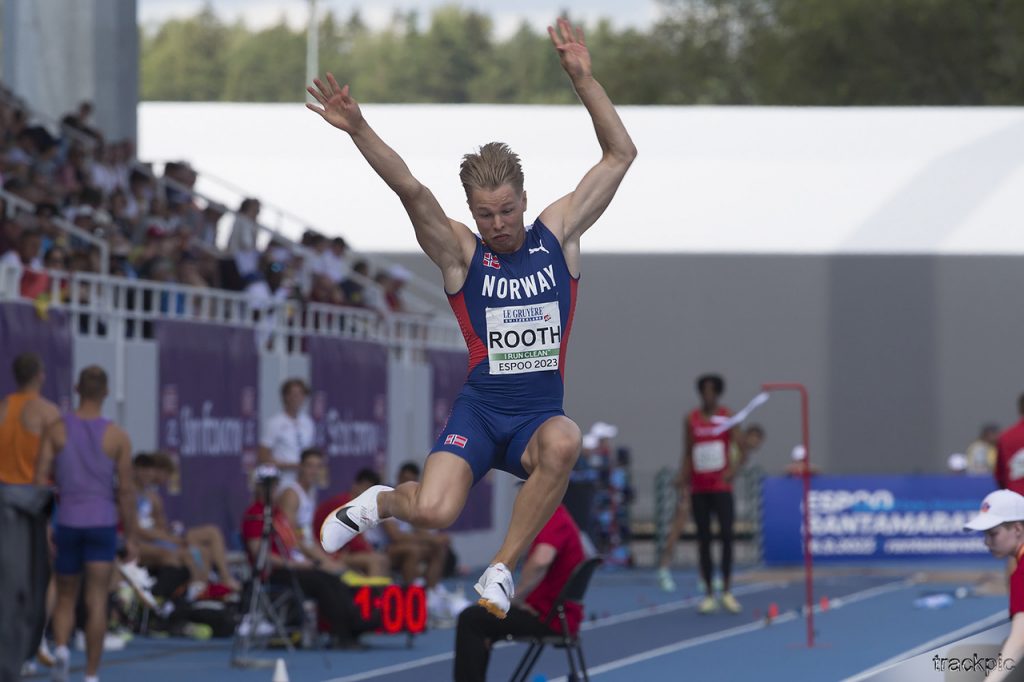
While only 17cm separated Rooth’s and Skotheim’s shot bests (14.65m to 14.48m), Sander’s outdoor puts this year have been under 14m, 13.74m in Götzis and again Espoo. Rooth, however, stretched his PB by over half a meter to 15.31m with his third-round throw, finally reflecting the distances he had achieved with the U20 implements. Thus, Rooth consolidated the successes of his 100m PB and long jump, and moved back into the lead, 2674 to Skotheim’s 2589.
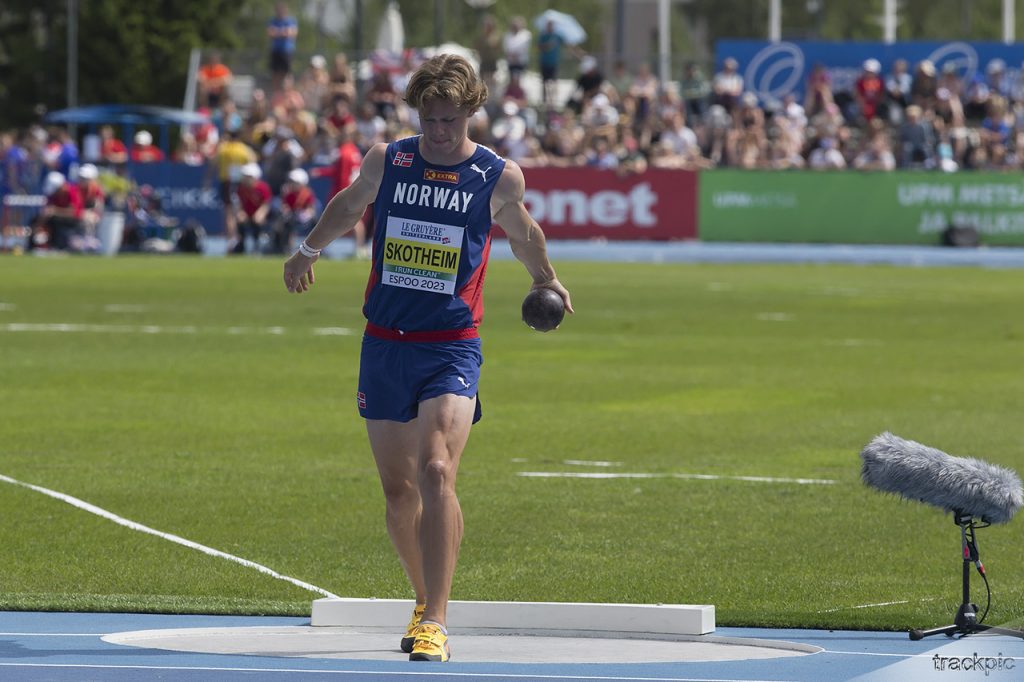
But with Skotheim’s piece de resistance high jump to come, the event in which he is currently simply the best decathlete in the world, and his strong 400m, the lead would surely swing back firmly to Skotheim by the end of the day.
In his three previous combined events competitions in 2023 Sander had jumped 2.15m, 2.19m, and 2.15m. In individual competitions, he has reached 2.20m. Again, he delivered, with a smooth path to a best of 2.15m.
Rooth, on the other hand, had never been over 2m. The high jump was his weakest event, his best 1.97m dating from 2020, and was the stage at which he would inevitably haemorrhage points to Skotheim.
The rest of the field made its way through the early heights. Through 1.79m, 1.82m, 1.85m, 1.88m. Still no Skotheim, of course, but no Rooth either. What was going on? Every other man with a PB lower than 2m had come in by 1.85m. Rooth was either taking a hell of a risk, or had something unexpected, something special in waiting.
It was something special.
Floating over 1.91m, passing at 1.94m, and easily achieving 1.97m, Rooth moved on to two metres. He sailed over. But for a disruptive stumble and fall in his first attempt at 2.03m – which he then cleared – 2.06m would have clearly been on the cards. As it was, Rooth slashed Skotheim’s potential points gain by some 50 points. This would be the defining moment of Rooth’s decathlon. Skotheim moved back into the lead with 3533, Rooth 3505.
In the final event of the first day, the strong winds interrupted the run of lifetime bests enjoyed by many of the athletes thus far. Not for Rooth. While Skotheim ran faster, in 47.69s, yet again Rooth ran faster than he ever had before, with a PB of 49.05s.
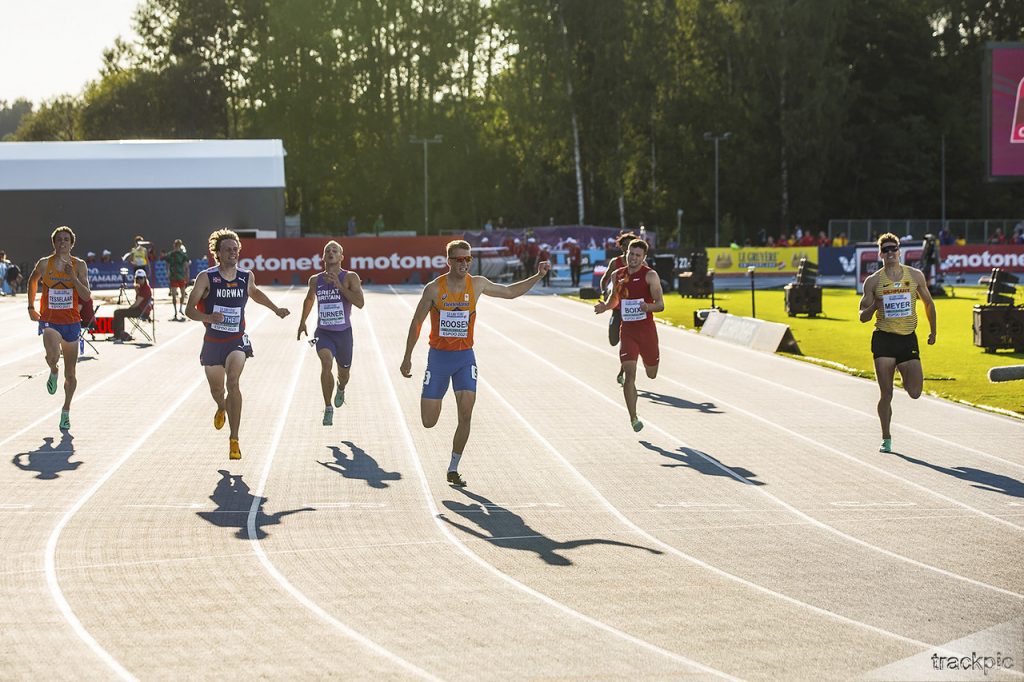
Day one, Skotheim 4457, Rooth 4364.
Skotheim was ahead by less than 100 points, and Rooth was performing way above expectations.
As Skotheim came through the mixed zone, his body language hinted he was just a little short, wanted just a little more, just a little frustrated. “I’m so happy for Marcus,” he acknowledged. “He’s doing amazing.”
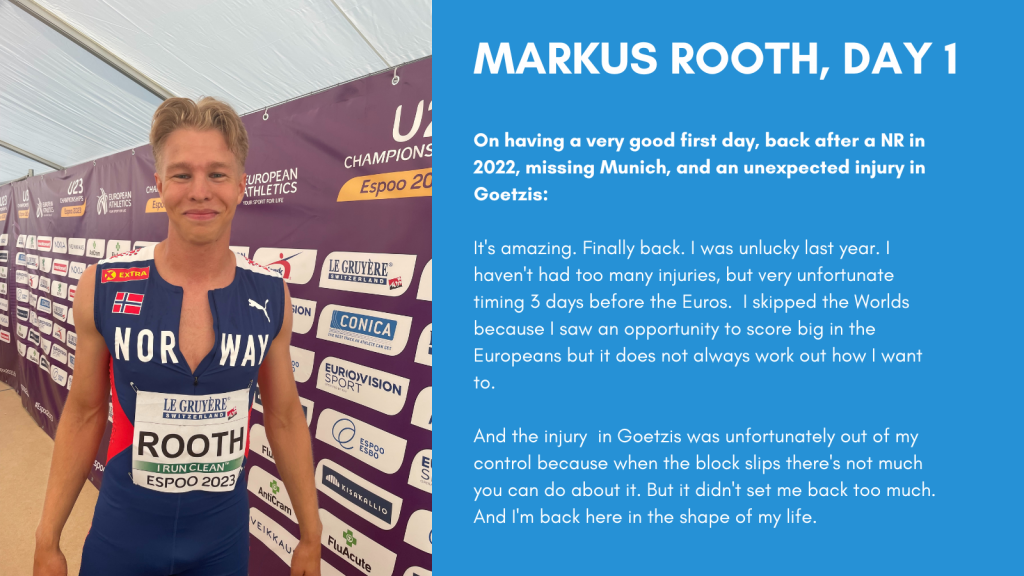
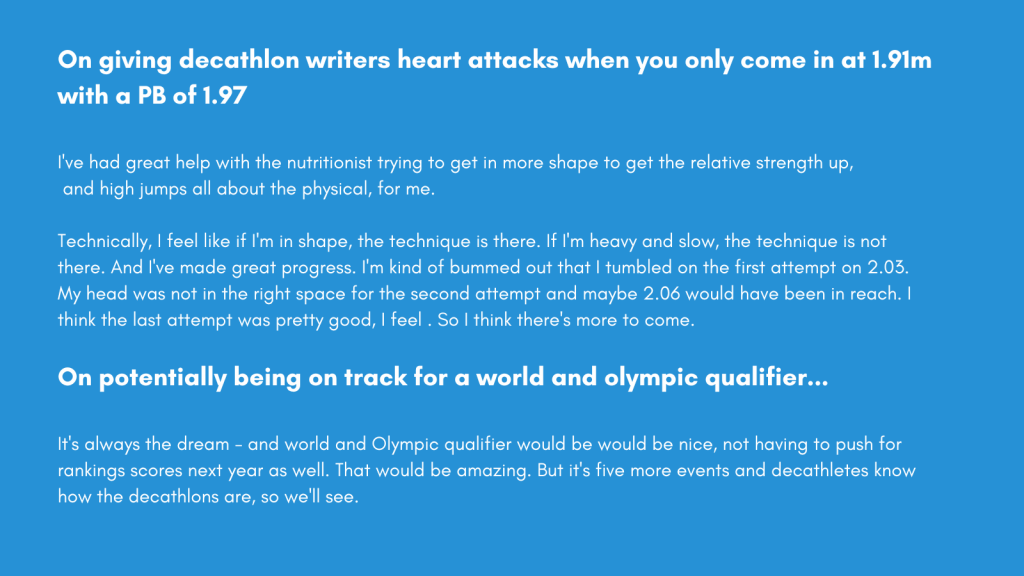
DAY 2
Rooth began Day 2 as he finished Day 1, stubbornly refusing to let anything halt his progress.
The elements continued to conspire against the athletes, but with the benefit of cancelling out the intense winds that had favoured the leaders in the previous day’s long jump. In the 110m hurdles, -2.7 and -2.6 winds impeded the first two heats, and -1.6 in the final heat with the fastest hurdlers.
Skotheim was the only athlete in the field who had previously run under 14 seconds, on this gusty occasion managing only 14.68s.
Rooth? The fastest overall, 14.43s, just 0.2 from his lifetime best. Whatever score Rooth was going to put up, it was surely just a marker for something even better in consistently good conditions.
After six events, Rooth had taken a further 40 points out of Skotheim’s overnight lead, now trailing just 5284 to 5346.
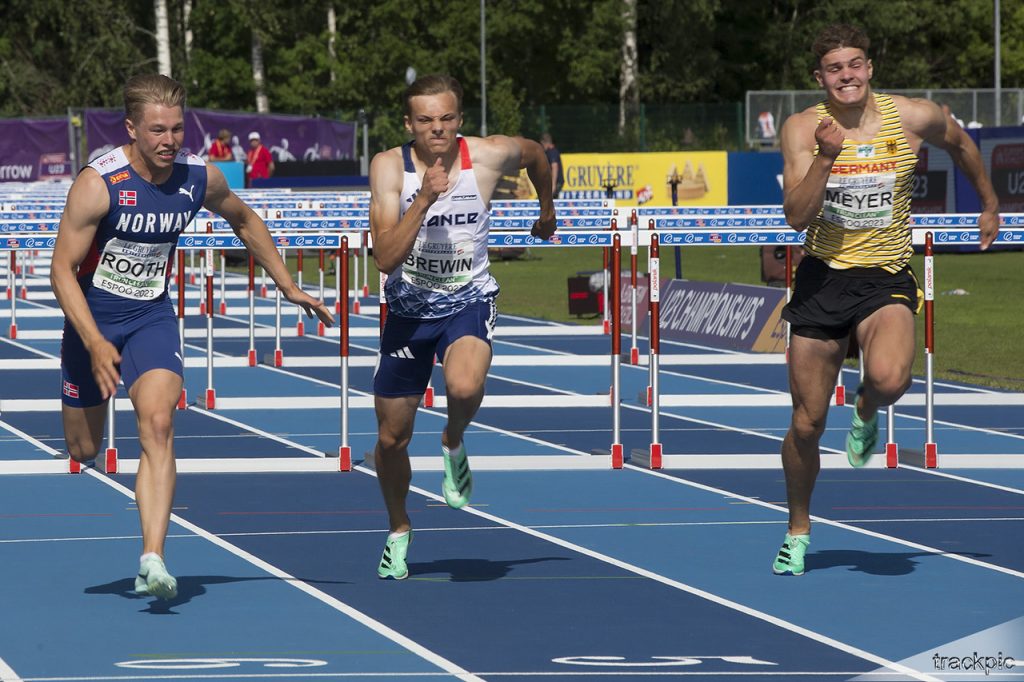
The discus was only the second event in which Rooth could expect to have a stronger points haul than Skotheim. He collected on it too, with 48.63m. But Skotheim held his ground, throwing a decent 43.31m (his best is 44.80m). As expected, Rooth edged into the lead, 6126 to 6078.
Skotheim has broken new ground in the pole vault this year, improving his lifetime best from 5m to 5.35m in the first six months of 2023. Once he is consistently clearing those higher heights, and able to translate them into decathlon, Zach Ziemek’s record across the three jumps in a single decathlon (7.74m, 2.14m, 5.55m) may be in danger.
The vault beds were positioned at the forest end of the Leepävaara stadium, the upturned athletes slashing a flash of colour through the thick wall of green beyond. On this occasion, Skotheim’s best was 5.10m, which should have been enough to get back alongside Rooth, who came into the competition with a PB of 5.05m. It wasn’t.
Despite the crosswinds troubling the field in many of their jumps, Rooth was able to improve his best further, also to 5.10m. Skotheim hadn’t conceded any further to Rooth, but he hadn’t gained any points either.
Rooth retained the lead, with a stronger javelin to come. Skotheim had his spectacular 1500m card yet to play, but the impact would be lessened against Rooth, who was himself no dawdler.
And so, it would seem, the Norwegian sparring match would continue right through to the final moments of the decathlon.
The last time the two young Norwegians had embarked on the penultimate of the ten events, it was in Grosseto in 2022, where the sky closed in, and thunder and lightning provided the backdrop for the occasion on which they had both breached Roe’s national record. It seemed that had pleased the Nordic gods, because they again sent the steely skies and electric storms to provide the scene for the finale, as thunder rumbled in Espoo.
In the javelin Rooth threw 63.71m, Skotheim 57.96m. Marcus 7861, Sander 7726.
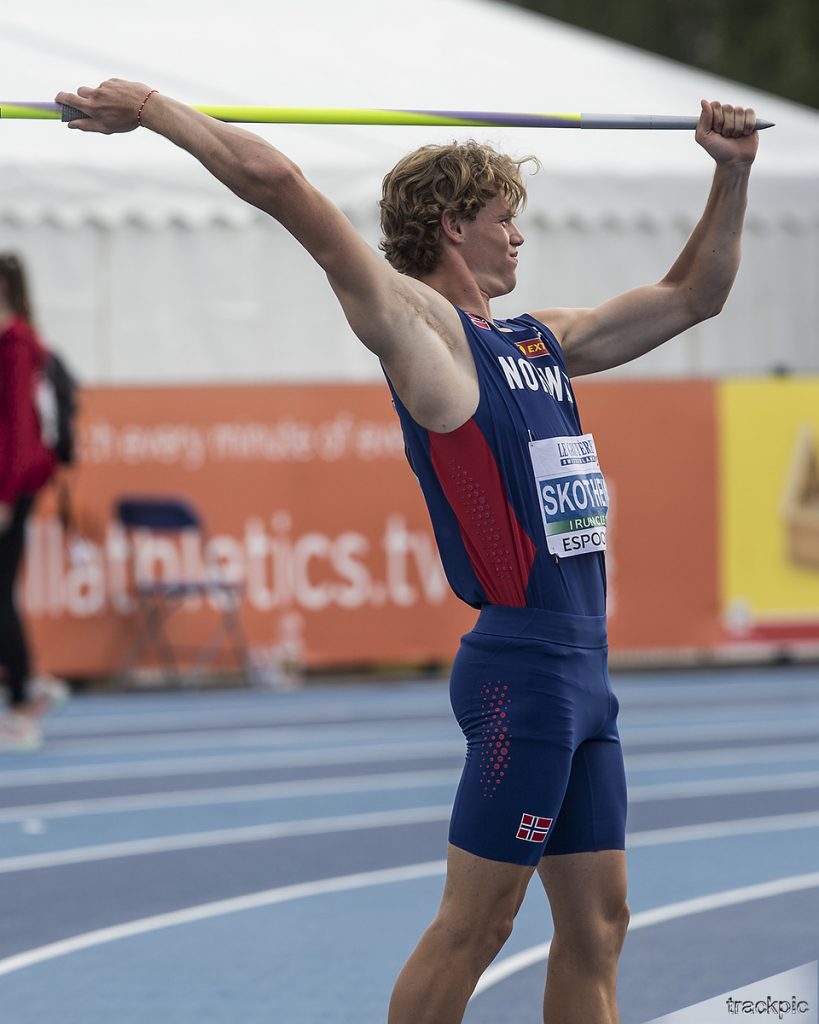
The European U23 gold medal was the prize on this occasion, but for Rooth, there was more at stake. Skotheim already had an automatic world and Olympic qualifying score, but Rooth did not, and he sat outwith the world rankings for the restricted field of 24.
The final spot for Budapest was at that point held by Dan Golubovic of Australia, with a ranking score of 1225.
To exceed that score, Rooth would need a decathlon score of 8170 boosted by a gold medal points bonus of 45, or 8215 boosted by a silver medal points bonus of 38. Only a disaster would prevent Rooth from achieving that goal.
Furthermore, Rooth only needed to run 4:53 to secure 8460, and automatic qualification for Budapest and Paris. That was on track too. So, the next goal would be Skotheim’s national record, 8590. That would require a 1500m of 4:32.31 for Rooth. His PB was 4:33.
But Rooth has a habit of reinventing his 1500m.
In 2019, ahead of the last event of the European U20s in Boras, Rooth’s lifetime best was only just under 5 minutes. By the end of the competition, his PB was 4:37 and he had a bronze medal.
In 2021 in Tallinn, he improved that to 4:36 to win bronze at the last edition of the European U23s. In 2022 in Grosseto that came down to his current mark 4:33, which he ran to set the then national record.
So, it would be foolish to assume that a Rooth who had – but for a headwind in the hurdles – improved every one of his running events, had maxed out on what he could achieve in the 1500m.
Skotheim ran the 1500m in the way he always does, from the front, pushing on and on, a solo run to the finish line. He crossed the line in 4:16, a three second PB. But as he turned to see the athletes finish behind him, the hang of Skotheim’s head betrayed that he knew it had only secured him silver.
Rooth had attached himself to other athletes in the pack, aiming for 4:30 and in the end surpassing that, with a three second lifetime best of 4:29.
The calculations on rankings points were an utter waste of time. Rooth had scored 8608, soaring over the qualifying mark for Budapest and Paris, and resting sixth on the 2023 world lists so far, only 11 points behind the Olympic champion Damian Warner.
For all that he had to fight in every event, Skotheim delivered yet another superb score, 8561, his second 8500+ plus mark in seven weeks.
Bronze went to Roosen, two of the three medallists from Tallinn 2021 rearranging themselves, and with 8128 the Dutchman was only 29 points short of his PB from Götzis.
Germany’s Marcel Meyer broke through 8000 points for the first time, his gutsy 4.5 second 1500m PB the highlight of his performance to finish fourth with 8096.
Perhaps the most significant breakthrough beyond the medals, Rasmus Roosleht, of Estonia, didn’t waste his time iteratively moving closer to 8000 points. Instead – powered by his mighty throws, several track PBs and a big pole vault improvement – he drove straight through the mark. He became Estonia’s 20th man over 8000, with 8010, and was in third place until the faster Roosen and Meyer overtook him in the 1500m.
Jente Hauttekeete of Belgium had much to celebrate in sixth place from his third senior decathlon, most significantly matching his 2.12m indoor high jump best.
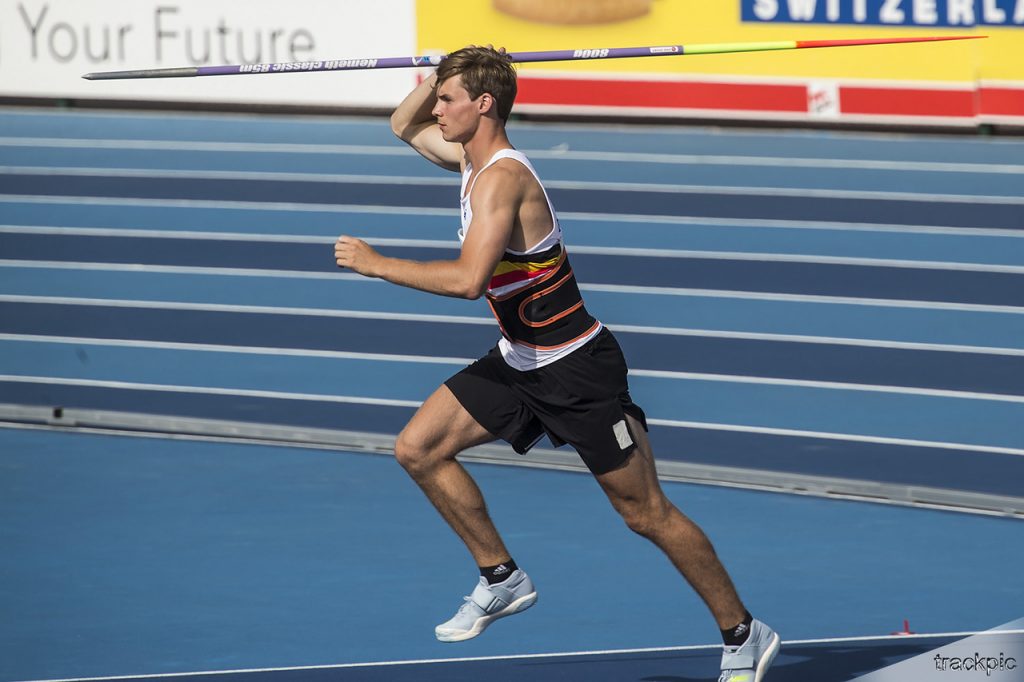
Andreu Boix in seventh represented the highlight of a Spanish trilogy of emotions, consolidating his 7961 in Arona with 7844. Less fortunate were Pol Ferrer, troubled by a hamstring from the start but battling through the high jump before conceding defeat in the 400m, and an inconsolable Jose San Pastor, after a promising start rendered unable to jump by a groin problem.
Luc Brewin had an impressive championships debut for France, while Jeff Tesselaar set half a dozen PBs – including a massive eight second 1500m best, to beat even his teammate Roosen.
Thomas van der Poel backed up his 7600+ score from Bernhausen with a 7558, successfully completing a return to competition in 2023. Elliott Duvert enjoyed lifetime bests in his runs and shot, Aleksi Savolainen thrilled the home crowd with a first time 5m pole vault, Zsombor Gálpál impressed with his improved javelin just short of 60m, and Dominique Hall’s debut for Austria – after transferring from the US – will set him up well for future competitions.
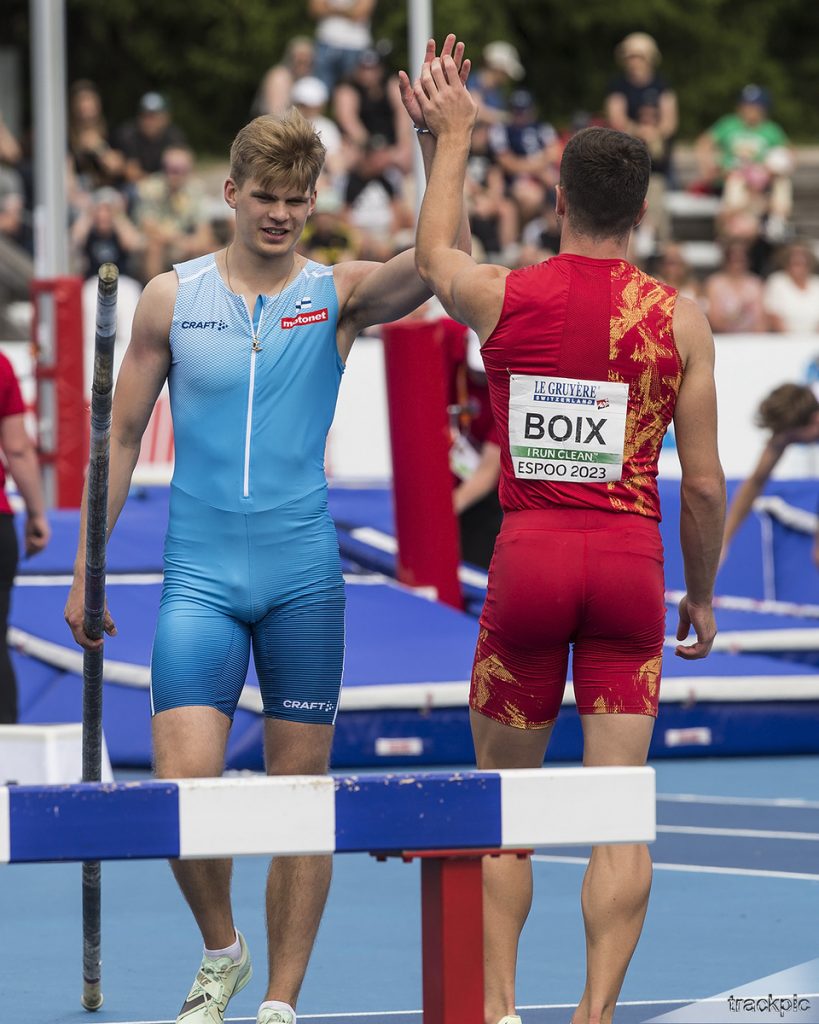
I opened the preview of this decathlon with a quote from San Pastor: “I think my age group is one of the best in history.”
In the age of Rootheim, it didn’t disappoint.
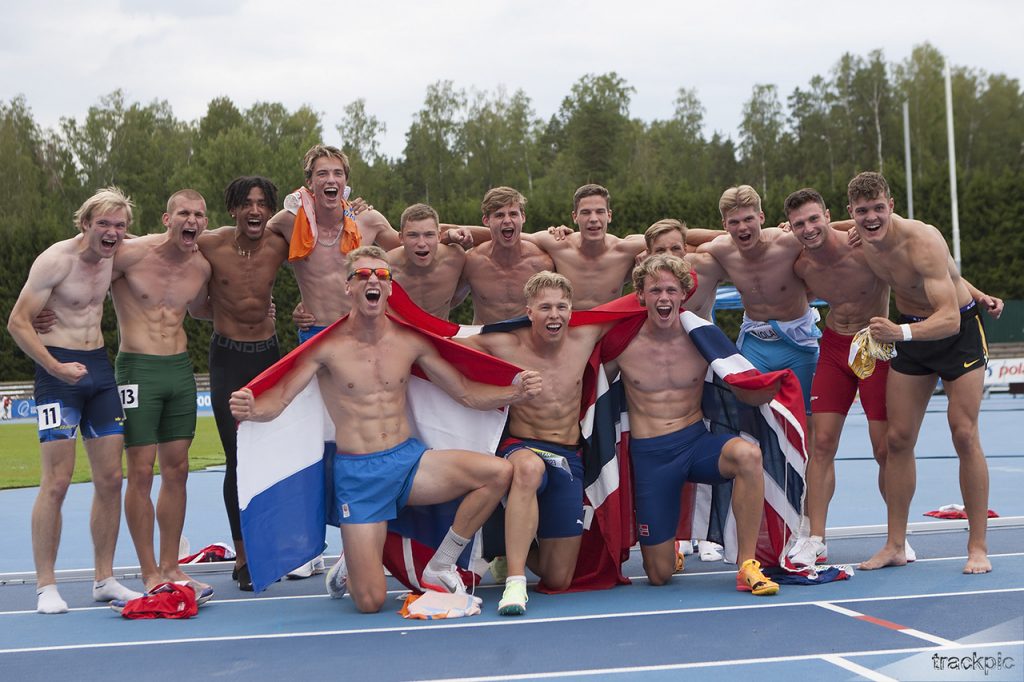
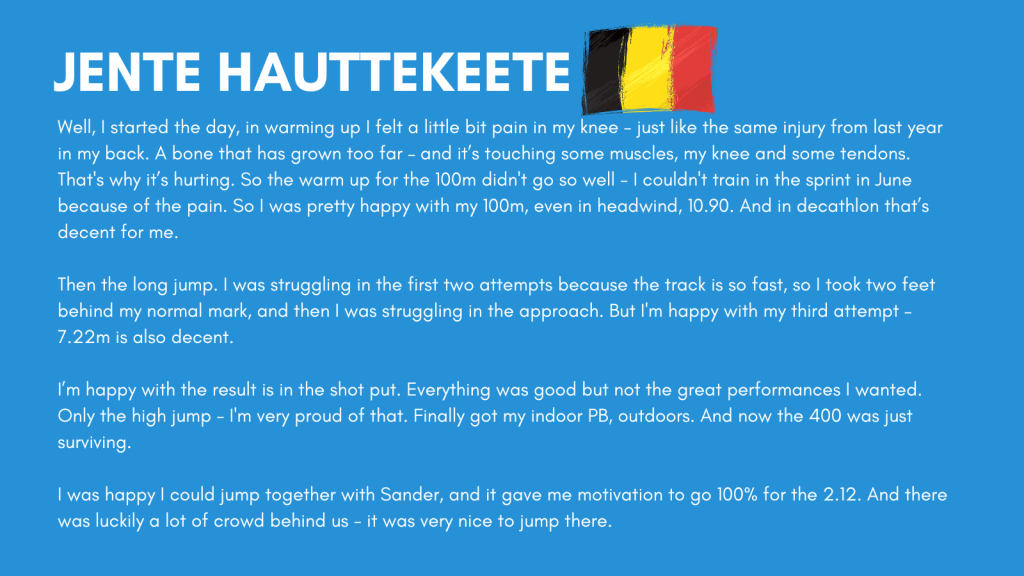
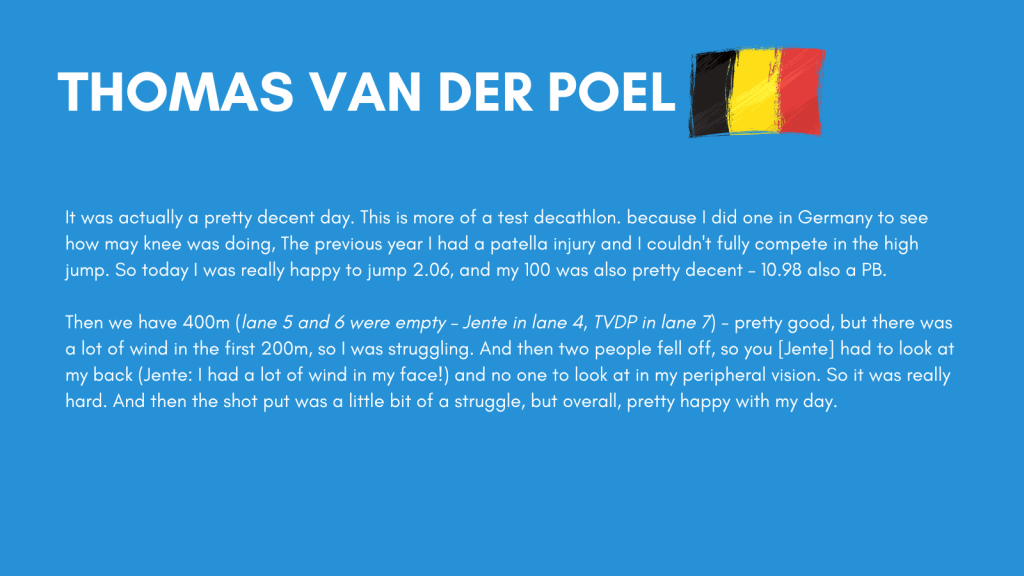
All photos with the kind permission of Olavi Kaljunen @Trackpic

